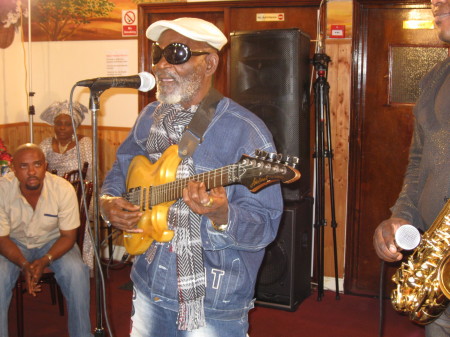By Segun Fajemisin

Thursday 12th June marks the anniversary of Fatai Olayiwola Olagunju (aka Fatai Rolling Dollar) who passed away in 2013. A gifted musician and a legend in his own time, Fatai Rolling Dollar was the ultimate comeback king. Prior to the fame and acclaim that characterised his last years on earth, his story had been one of a dramatic rise to fame and an ill-fated fall-back on the turf.
Born on the 22nd July 1927 in Lagos, Fatai hailed from Ede in south-western Nigeria. He attended schools in Lagos and was later to move to Ede at the age of sixteen, on the death of his father. Being of a royalty, singing was not a favoured career choice for the growing prince. Fatai Rolling Dollar however showed a rebellious streak at an early age by allowing himself to be drawn towards music.
In 1957, he formed Fatai Rolling Dollar and his African Rhythm Band, an eight-piece ensemble which included Ebenezer Obey. The group recorded several singles for Phillips West Africa Records. Having had some hits with Phillips, the African Rhythm Band then moved to Jofabro/EMI where they recorded over one hundred and fifty singles and had many hits for the company including “Sisi Jaiye Jaiye” and “Won Bumi“.
Ebenezer Obey eventually left to form his own group. Approaching business from a different perspective, Obey’s band infused a fresher style, adding more instruments including the talking drums and slide guitar. Fatai thereafter reformed and renamed the band Fatai Rolling Dollar and his New Millennium Band.
The epochal late sixties witnessed the civil war in Nigeria. The ripples of its effects continued to be felt even as the seventies ushered in a reflective wind of change in the Nigeria social scene. Nowhere was the sweeping change in people’s lifestyle and mood more pronounced than in music and entertainment. A new corps of Nigerian musicians appeared on the scene, in particular Ebenezer Obey and King Sunny Ade, who had both benefited from Fatai’s musical inspiration. They took the country by storm as the fortune of musicians like Fatai Rolling Dollar dwindled.
In order to keep afloat in the music business, Fatai embarked on musical equipment rental service to augment earnings from the now infrequent musical engagements. Obey, on his return from touring abroad, was on record as having assisted his erstwhile leader by giving him some musical equipment to add to his stock.
Fatai’s house was a few doors down from the Kalakuta Republic, a compound at Moshalashi, owned by the young, up and coming Nigerian superstar, Fela Anikulapo-Kuti. Fela’s celebrated nightclub, The Shrine, was also situated in this area at the Empire Hotel. The infamous invasion of the surrounding area of Kalakuta Republic and the consequent inferno that ravaged the lot had devastating consequences for Fatai whose means of livelihood was largely destroyed. Whatever could be savaged of the equipment also ended up in the hands of looters who took advantage of the situation. With his livelihood in ruins, Fatai moved a few miles away to Mushin, with his wife and five children.
The seven family members lived in a single room in an old style housing unit, popularly referred to in street lingo as “face-me-I-face-you”. At this low point of his life, Fatai lost all five children to illness within three months and his wife worked herself to the bone, finally succumbing to exhaustion and death. For twenty years, he remained impoverished and frustrated, doing various odd-bits, including a security job at the stadium.
In 2002, he resurfaced having been located and linked up with the late maestro, elder Steve Rhodes, from where the second phase of his musical odyssey picked up and would go from strength to strength. The Yorubas say: “Eni ija o ba, kii pe ara re l’okunrin.” (Anyone who has not been confronted by sheer adversity should not lay claim to gallantry). The summation of Fatai’s persona was that of one man who came, saw and conquered in chivalry.
The secret of the vast appeal of his music may well lie in his multifarious incursions, lending towards Creole and Afro-Cuban variants amongst others. Fatai would also be remembered for his dexterous palm wine guitar infusion and the raw percussive manipulations of Sakara and Agidigbo, the latter instrument which he has been largely credited as having perfected. Another dynamism inherent in his musical career was that Fatai’s voice sometimes demonstrated a deep, throaty, rich quality and at other times a falsetto tone such as was displayed in “Sisi Jaiye Jaiye” and “Saworo”.
An amazing singer and performer whose band of devotees cuts across diverse strata both at home and abroad, Fatai Rolling Dollar, though a vintage musician, also became a new phenomenon before he eventually transited to the great beyond.
His place, without an iota of doubt, is well preserved in the annals of music and entertainment in Nigeria.
*Segun Fajemisin lives in London








